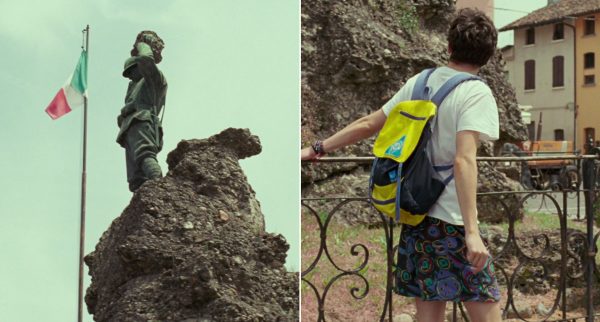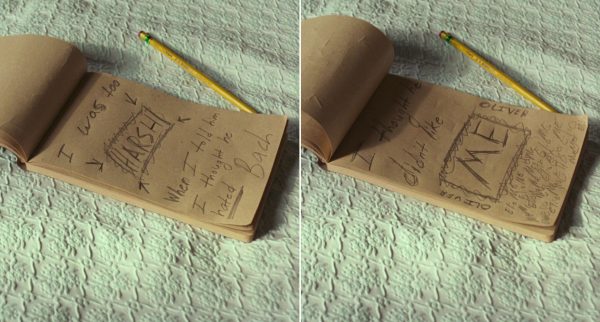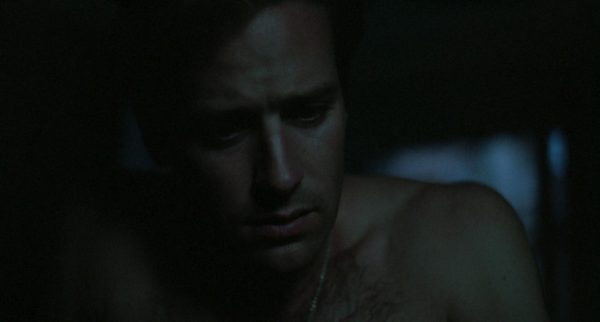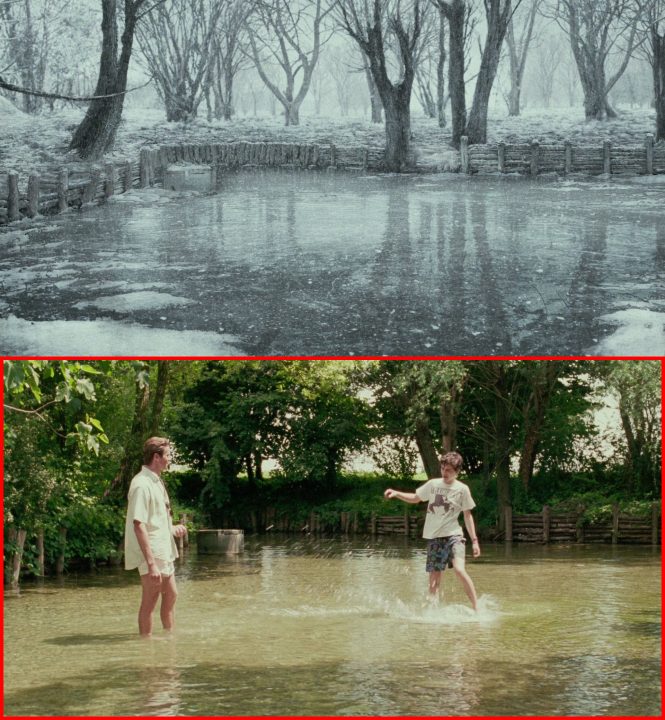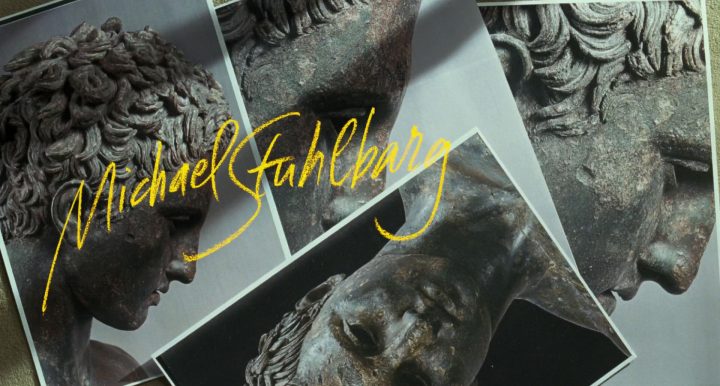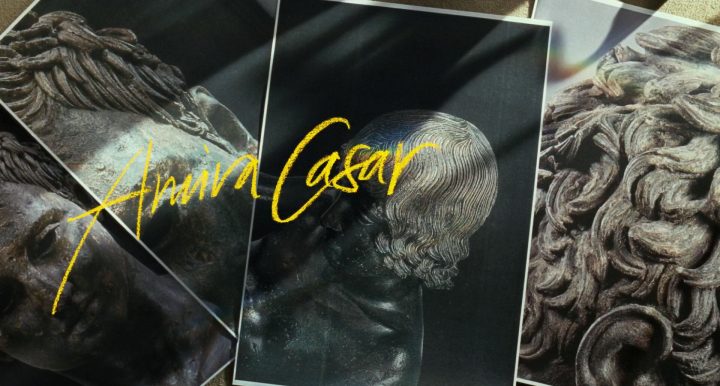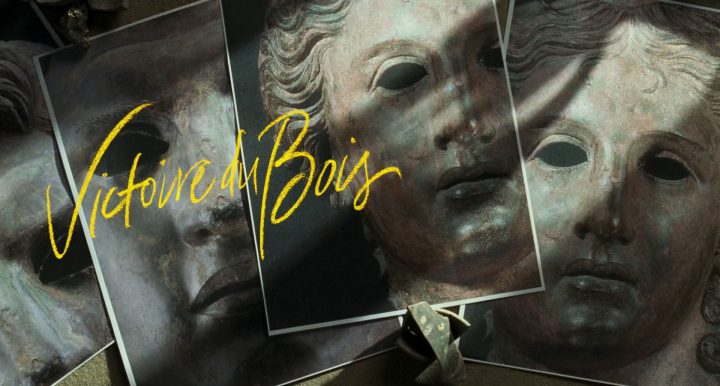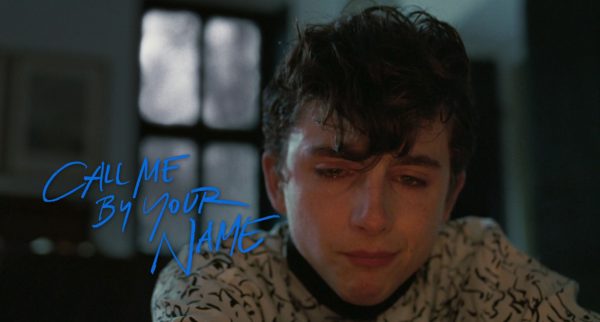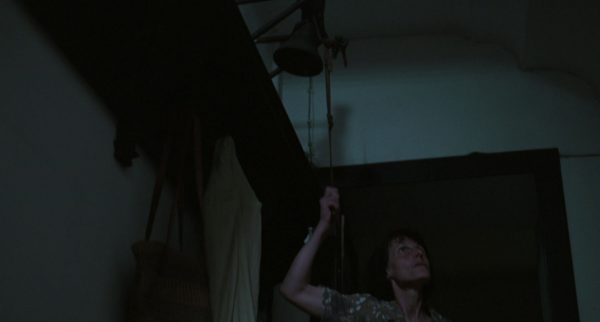
I remember everything: The many closures of Luca Guadagnino’s Call Me by Your Name
Luca Guadagnino‘s 2017 film Call Me by Your Name is a subtle work with a lot going on between the lines. This article is a guide to its final scenes. Through an abundance of visual examples, lines will be drawn to earlier parts of the story to map out the path towards closure, of not only its characters but the film itself.
(There is also a second article, discussing the piazza scene, the hotel room scene and windows as motif. The third and final article highlights some of the film’s smaller moments, discusses the use of close-ups, track-in camera movements and dissolves, examines the pervasive use of fruit as a metaphor of sexual desire, and looks at other motifs, staging ideas, echoes and other structural properties. There is also an enclosure listing the film’s many long takes.)
Before the analysis starts, however, some words about a fascinating feature of Call Me by Your Name that adds considerable layers to an already complex film. Embedded in its body is an extensive network of cultural and historical references. Against this backdrop, the film’s central theme of daring to act upon one’s deepest emotions gains a timeless dimension, properly so since this has been a central issue for human beings all through the ages.
Thus, in a pivotal scene where 17-year-old Elio starts to indicate his feelings for the 24-year-old Oliver, a visitor with the family, the camera looks up into the sky to take in a monument over a World War I battle and later gazes up at an old church. At a later point in the narrative Mussolini is invoked. The action unfolds either against a peaceful rural nature basically untouched by modernity, or against small, interchangeable Northern Italian cities whose architecture recalls centuries of human culture. One could easily envision the family’s small stone swimming pool being used by ancient Romans. In one scene Elio’s mother reads aloud from a 16th century story collection, which posits the film’s central question as “is it better to speak or to die”, and as soon as that is uttered, there is a power failure, stripping a layer of modernity away from the characters, who now sit in the dark.
Music from various periods is played: for example, Bach from the 18th century, Satie and John Adams from the respectively early and late 20th century, pitted against modern pop and rock, for example a Giorgio Moroder tune and a Psychedelic Furs song during a dance event. There is also an almost constant emphasis on versions of the same material: in a memorable scene, Elio says about a Bach piece: “I just played it the way Liszt would have played it if he’d altered Bach’s version,” and soon after “I just played it the way Busoni would’ve played it if he’d altered Liszt’s version.” (Liszt and Busoni are themselves from different epochs.) This is in playful revenge for Oliver’s virtuoso analysis of the etymological roots of the word “apricot”, rattling off permutations of the word from a variety of historical cultures.
Building on that, as many as four different languages are spoken in the film: English is predominant, French and Italian are secondary languages, and German is included, and translated from, during the reading-aloud session – all methods of expressing the same thoughts. Elio is reading an Italian translation of Pearl S. Buck’s “Dragon Seed“, just one among a series of novels seen in the film, joining all its representations of other art forms. (The film Call Me by Your Name is itself a re-imagining of another work, the source novel by André Aciman.) Several pieces of music appear in both diegetic and non-diegetic form.
Furthermore, Elio is transcribing music into written notes, the same material in another form. During the disco scene the characters are translating music into dance.

In the image above, not only was this (part of a) statue involved in a 19th century romantic relationship, given as a gift to a beloved – complementing Elio and Oliver’s romance – but it is, in keeping with our discussion, a copy, made after an original by the ancient Greek sculptor Praxiteles. It is also part of set, of which a pair were melted down and “recast as a particularly voluptuous Venus”, another transformation. Finally, the film’s archaeological aspect is its most far-reaching historical tentacle and representation of its oldest art form.
Even though Call Me by Your Name has received a lot of acclaim, it is also a divisive film. Its detractors often point to its cultural references and variety of languages as mere affectations, a surface gloss of ingratiatingly “cultured” signalling. On the contrary, they seem to be part of a meaningful system. The film attempts to superimpose the personal story of Elio and Oliver on to a higher, poeticised level of timelessness and the understanding of life as permutations of the same basic experiences.
*
The following analysis takes the form of a written “commentary track”. A variety of film-analytical points will be made for each scene, but with a special emphasis on how they are echoing earlier situations. “I remember everything” is a pivotal line of dialogue, and in the closing stages of Call Me by Your Name, it is as if the film itself is reminiscing about its past, striving to achieve closure along with the characters. The analysis is centred on screen shots, where images depicting those earlier callback situations are marked by red borders. The article presupposes that the reader is familiar with the film. (A plot description can be found here.)
The station
We shall embark upon the analysis with Oliver’s departure and his farewell to Elio at the train station in Clusone. The previous scene, in their hotel room the night before, ended in a melancholy close-up of Oliver, who seems to have realised they will never see each other again, that as soon as he is back in the US he will succumb to the pressure of adopting a traditional life. (He has an on-and-off girlfriend whom he hasn’t mentioned yet to Elio.)




Oliver’s barely 90-second departure scene is captured in only two shots, but could easily have been done in one continuous take. There is a cut, however, and it seems designed to happen with maximum impact and meaning, at the exact time the door is shut and the conductor’s whistle is sounded, as additional reinforcement of their separation.




Driving home

A stop in the city

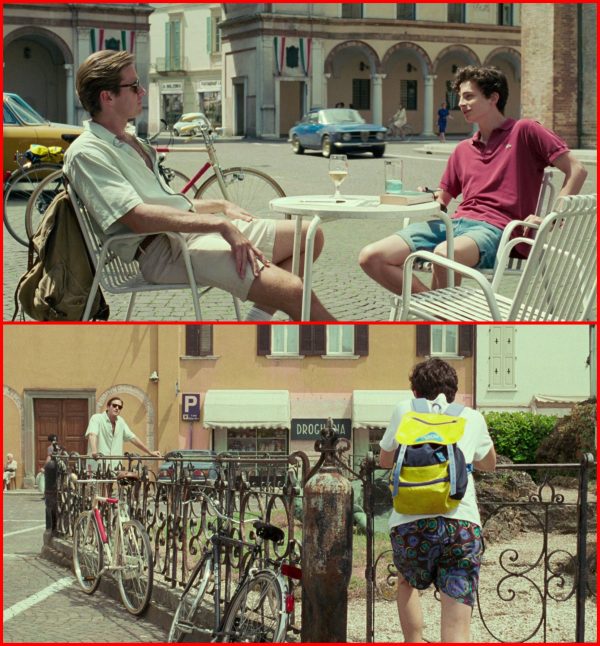








Home

Elio arrives in the same manner as Oliver (it is not the same car though). Since he left he has lost a lot of his innocence, become more adult, more like Oliver whom he has “replaced” – in keeping with the merging of their identities and sharing each other’s names. The car parks in the exact same spot as the earlier arrival, almost directly beneath the window of Elio’s temporary room, from where he and Marzia looked down at Oliver being greeted by the Perlmans.
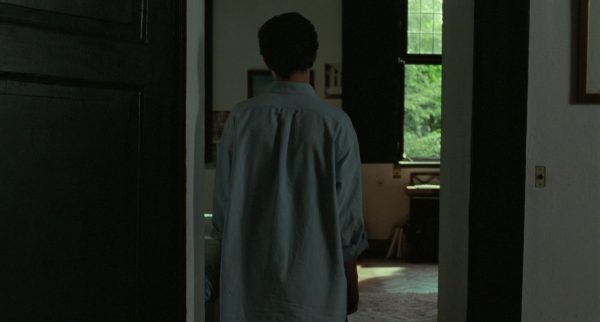



Conversation with Father
Over the empty steps we heard the tinny, distant sound of the bell that Mafalda the maid uses to signal that dinner is served. This is another reminder of Oliver, because bells have constantly been connected to him throughout the film. See this enclosure for a list of all occurrences.
The monologue scene too is ringing with echoes from earlier situations. Elio has skipped dinner, and ignored the dinner bell we just heard, like Oliver did after arrival. Dr. Perlman is reading something, possibly Oliver’s manuscript. The scene unfolds in the same room where Elio and Oliver greeted each other for the first time.
Perlman is smoking (and he also has a glass of liquor handy), something we have only seen him do once before (and also then probably meaningfully, see below). This is Perlman’s big scene and his cigarette echoes how Oliver starts smoking for the first time during another big scene, the pivotal piazza scene where Elio declared his feelings for Oliver.
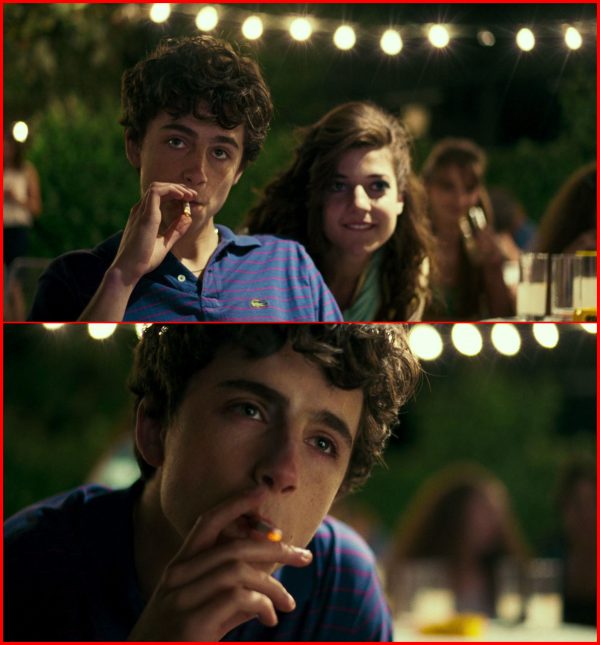






Perlman starts smoking as soon as Elio sits down, but there are also other developments within the scene. In between “just remember I’m here” and “right now you may not want to feel anything”, during the below montage, he takes off his glasses – there shall be no obstacles, as he eventually embarks upon his own contribution to the speak-or-die motif. (It is also important, of course, for his performance that his eyes can be seen clearly.)
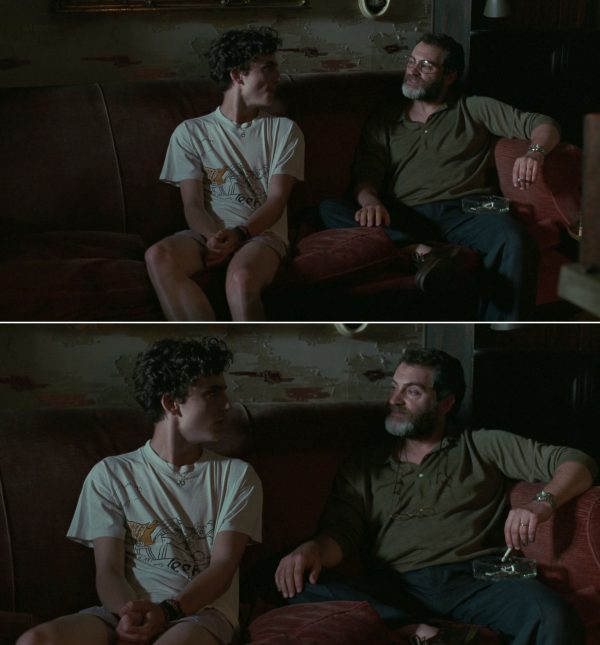

During this scene Perlman, a likeable yet somewhat remote figure whom the cast list does not even allow a first name, gradually becomes a completely different person than the boyish, capricious professor we are familiar with. At one of the earlier dinners, he even approached the table jumping along, using the same kind of childlike, exuberant body language as his son. Now he is a tormented man, confessing that: “I may have come close, but I never had what you two have.” It is not entirely clear, though, whether he speaks of a gay relationship or merely one based on deep love. But considering the film’s central gay relationship, his use of the quite momentous phrase “clear the air”, his keen interest in the homoerotic male statues during the slide show (where he is smoking, like in this potential “coming-out” scene), and his agitation over Elio’s perceived dislike of the gay couple who come visiting, one tends to favour the former.
Speaking of them, the portrayal of Isaac and Mounir as “ridiculous” has been pointed out by detractors of the film as evidence of a hostility towards gay relationships. It is true that their appearances are a bit eccentric, but it is noteworthy that of all the family’s visitors it is precisely this couple that bring the most happiness into the Perlman home, putting Elio’s parents into a raucously good mood. Even though polite enough in their company, Elio is openly disdainful of them – he has probably never thought of himself as gay before and could well be prejudiced – and calls them Sonny and Cher. (When being called out for this by his father, he evades by claiming it is what his mother calls them, but as we have seen, Elio can be quite deceptive so this could be a lie – anyway, such a moniker can also be lovingly applied.) When Perlman confronts Elio about his disdain with “is it because they’re gay or because they’re ridiculous,” this does not necessarily mean that Perlman himself thinks they are ridiculous, but that he observes that Elio might think so.
As for the notion that Elio’s parents, and the film, might only approve of homosexuality as long as confined to youthful experimentation – thus the need for the middle-aged Isaac and Mounir to appear “ridiculous”– their enthusiastic reception in the epilogue of the news of Oliver’s marriage cannot necessarily be taken at face value, since this is consistent with general politeness and especially with Perlman’s usual boyish and exuberant behaviour. As for Annella, her knowing glances towards the lovers have never shown the slightest hint of disapproval, just quiet observation, and in one scene she actively tries to convince Elio that Oliver likes him. It is also she who chooses the Heptaméron story that inspires Elio to actively pursue Oliver, with the words “I can’t remember where we left off, but I think you’ll like this one.” Finally, it is she who suggests that Elio join Oliver on the trip. And during the monologue, a scene painted as being open and honest, Perlman says “how you live your life is your business” and “in my place, most parents would hope the whole thing goes away – pray their sons land on their feet, but I am not such a parent” (italics mine). Not such a parent that would not talk to a son in emotional crisis, or not such a parent that would hope his son’s homosexuality to go away? My guess is both, especially since it comes directly after: “Look, you had a beautiful friendship. Maybe more than a friendship. And I envy you.”
In any case, Perlman is clear about his regret of having settled for less in later relationships. His intensity of emotion as the monologue progresses, especially when he says “we rip out so much of ourselves to be cured of things faster, that we go bankrupt by the age of 30 – and have less to offer, each time we start with someone new,” forcefully indicates that he is speaking from his own bitter experience, and that his current marriage might well be based more on friendship than deep love.
It is easy to underestimate this scene. Upon this author’s first viewing it seemed surprisingly direct in a film otherwise relying on the unspoken, too much of a “big scene”, too preachy, too uncinematic in its static set-up and emphasis on dialogue. But it took only a second viewing, along with a better understanding of character, context and theme, for its magnificence to become apparent.


The scene becomes even more moving as the older man declares “something always held me back or stood in the way,” because here gentle piano music starts complementing his verbal lament. This also has a specific purpose: it is Ravel’s “Ma mère l’Oye” (some background for it here), a non-diegetic reprise of the music from a record player in an earlier scene, as Elio’s mother reads to them from the Heptaméron. That seance introduced the speak-or-die motif, which is very appropriate since this is what Perlman responds to now. This is an excellent example of how intellectual effort can heighten emotion, because since becoming aware of this musical connection, this author has started to mentally superimpose the two scenes on each other, to enriching effect. Perlman’s current bitterness also movingly points back in comparison to Elio’s more innocent, youthfully tortured behaviour during that reading session. (There is also a connection in mood, with rain and thunder in both scenes.)
Realising the connection between these scenes also makes apparent some exceedingly subtle mise-en-scène:

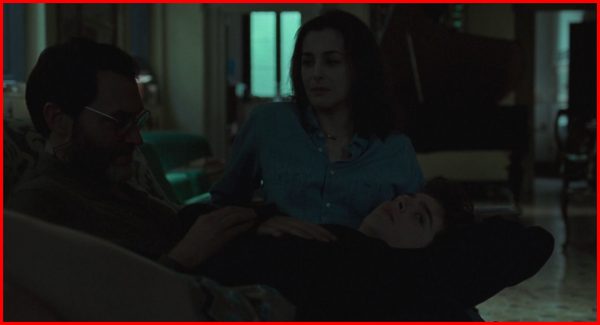
During the entire reading session, Dr. Perlman sits with his hand very near Elio’s as if there is a bond between them forged by the Heptaméron story’s theme, and Annella looks over at him before enunciating the key phrase “is it better to speak or to die” (words lent extra emphasis through being immediately followed by the power failure). Earlier, as she reads the sentence “despite the friendship that blossoms between them”, Perlman repeats the word in German (“freundschaft”) and they say it together, as if in some odd mutual understanding. Is this saying something, in quiet acceptance, about the status of their own marriage? Perlman has only moved once, lightly caressing Elio’s arm early on in the reading, but when Elio says “I’d never have the courage to ask a question like that,” this elicits a bit of movement as Perlman bobs his head, responding “I doubt that”. After that he freezes again, while Annella keeps on gazing inscrutably at him.
Back in the monologue, Perlman comes to his central point: “Just remember, our hearts and our bodies are given to us only once, and before you know it, your heart’s worn out.” Soon Elio asks: “Does Mom know?” Perlman answers: “I don’t think she does.” This is also somewhat ambiguous. Is it about whether Annella knows about the true nature of Elio and Oliver’s “friendship”? (It seems clear, however, from the parents’ discussion of Elio and Oliver’s trip that they both know, even though it is unspoken. Add to this her many knowing glances towards the lovers throughout the film.) Or is it about Perlman’s personal regrets about his current life? Anyway, regardless whether Perlman is a closeted gay, living in a heterosexual marriage of convenience, or whether Perlman does not really love his wife, both alternatives would be embarrassing for her.
Father and son look slightly naughty at the end, reinforced by the Ravel becoming playful as it enters a high register, as if they are on some level amused by their little secret. This is in fact reminiscent of Elio’s small deceptions in the film’s early stages: pretending to Annella that he hadn’t noticed Oliver’s arrival, “accidentally” dropping a book on the floor to wake up Oliver, pretending that he is engrossed in a book as Mafalda enters with clean laundry. And the whole family is in on the annual “apricot etymology test” of their guests, with Annella probably serving apricot juice on purpose to kick it off.
The Epilogue
The Ravel piece continues over the first two images of the epilogue, the same landscape in winter, the first one softly emerging from the film’s only fade-to-black, then merging with the next via a dissolve, as so many other times in the film. Then there is an abrupt cut to a third external image, with the music dying, as if a poetic dream has been crystallised into reality. The first image is of a field we have not seen before, the second brings back the little pond with the cold water, Elio’s secret place, and the third shows the Perlman house from a vantage point probably from the volleyball field. The images can be seen in the below slide show.
Elio soon enters the house. He still has the exuberant, show-off body language, but from the stylish attire he seems much changed. Although we have only seen him in his summer wardrobe before, the hair is different too. The family is celebrating Hanukkah, and while the family are “Jews of discretion”, Oliver proudly wore a Star of David necklace, inspiring Elio to do the same. The fact that the place is now teeming with Jewish paraphernalia foreshadows the return of Oliver to the film, by phone from the US.

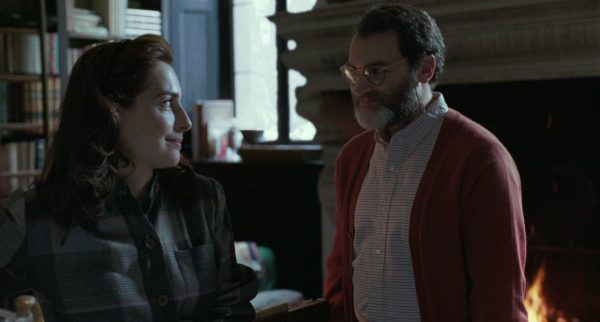



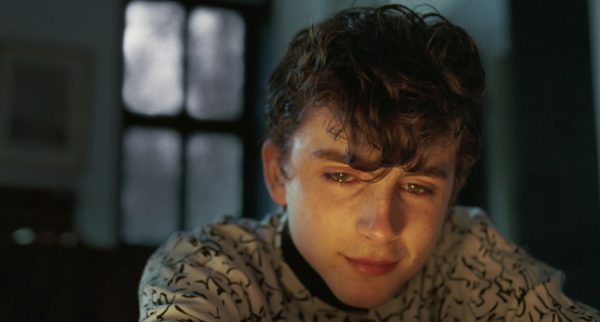
With its 208 seconds this is the film’s second longest shot, suitably only beaten by the central “speak or die” one-take scene in the piazza, which lasts 269 seconds. Right now he is heeding his father’s words and remembers even if it hurts. (“Right now, there’s sorrow, pain. Don’t kill it, and with it, the joy you felt.”) There is also an evident parallel to that fatherly monologue: it is now Elio who is working through a range of emotions. The shot is accompanied by “Visions of Gideon”, one of two songs Sufjan Stevens wrote especially for the film. (It was reportedly played on the set as Chalamet did the scene.)

Together with others but alone in his grief, in the room behind Elio life is continuing, with the ritual of setting the table amidst the larger ceremony of Hanukkah. After a while the end credits start running alongside Elio’s face, but the shot ends with an extended period where he and the music reign supreme again. Then the music credits and the thanks appear against a black background, accompanied by the crackling of the fireplace, which finally gives way to an indeterminate outside sound, of wind perhaps, or a river quietly flowing – pointing back to the external shots that started the epilogue. (If a river, that may allude to Oliver’s note from this book about Heraclitus: “The meaning of the river flowing is not that all things are changing so that we cannot encounter them twice, but that some things stay the same only by changing.”)


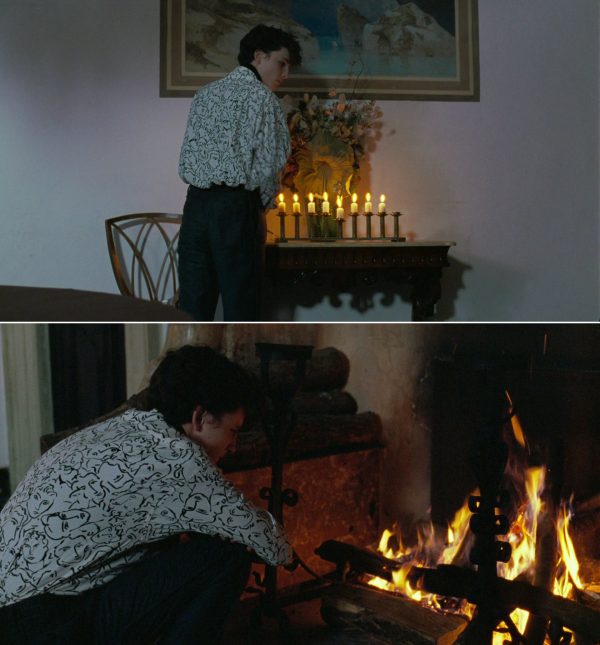


The end credits list a procession of names. At the very end of the credits there is a placard with “in loving memory of Bill Paxton“, Guadagnino’s good friend who died recently, another lost love. The title of “Visions of Gideon” introduces another name. Names are a vital component of a cascade of closures in Call Me by Your Name.
Elio’s phone call with Oliver ends with Elio, suddenly impatient with words, calling Oliver with his own name. Elio says “Elio” once, clearly, before following up with whispering “Elio” eight times – corresponding to, respectively, the one unlit and the eight lit Hanukkah candles. Oliver responds with just one “Oliver”, before he sums up the whole experience with “I remember everything”.
That is the last thing Oliver says in the film. Elio’s last word is “Elio”. The very last words uttered in the film is his mother calling out Elio’s name to him, twice. When Elio is gazing into the fireplace, which represents Oliver, thinking about him, he is echoing Oliver’s “I remember everything”. So Elio’s final act in the film is a fulfilment of Oliver’s last words. His former lover has gifted him the means to reach closure and catharsis.
The fireplace in front of Elio occasionally makes his face aglow with light, as if the memories of Oliver, however painful, are giving him life. Which is what Call Me by Your Name is all about.
*
Enclosure: The bells of Oliver
Bells are constantly connected to Oliver, a logical choice considering his temporary stay and time running out for him and Elio. (It is also tempting to include the horn and whistles of this train departure.) Note that Mafalda’s dinner bell is elegantly allowed to start and finish the pattern. Time is also important during Elio’s long day until his midnight rendezvous with Oliver, with him obsessed by his wristwatch, checking it repetitively.
- the dinner bell the day Oliver arrives, which he sleeps through, and then skips dinner, thus connecting him specifically to the bell
- bells as Oliver walks out to breakfast the next morning (the same bells can also be heard very faintly during breakfast before the Lake Garda trip)
- bells cut short Oliver and Elio’s conversation during the bank account trip, abruptly making him go off on his own (the scene starts with the camera looking up at a belltower, with a large clockface on it)
- bells as Elio speaks disparagingly about Oliver during dinner after the volleyball scene
- bells when Oliver returns to the house one afternoon, before he barges into Elio’s temporary room, suggesting they go swimming
- bells as Elio enters Oliver’s room to fool around with his shorts
- bells during the pivotal piazza scene as Oliver returns outside, telling Elio that his pages have been mixed up, so he is free this afternoon
- bells the morning after Oliver and Elio’s lovemaking, before they go swimming
- bells as Oliver and Elio enter the bus, going on their trip
- bicycle bell in the same scene as Chiara comes too late to say goodbye to Oliver, whom she is interested in (she also sounds the bell as she arrives at the Perlman house to see Oliver, before the Lake Garda trip)
- bells as Oliver is dancing to “Love My Way” with a local girl during the trip with Elio
- the dinner bell after Elio has returned from the trip, connecting to Oliver again since Elio is pining for him, and also skips the meal like Oliver did
The only time bells are not directly connected to Oliver is during Elio and Marzia’s date in the city, when she speaks of how readers are secretive people. But her “they hide who they are” could refer to Oliver’s sexuality. There is also a very faint, single tolling of a bell after Elio has finished his phone call with his mother, which could be said to connect to Oliver, getting further and further away on the leaving train.
